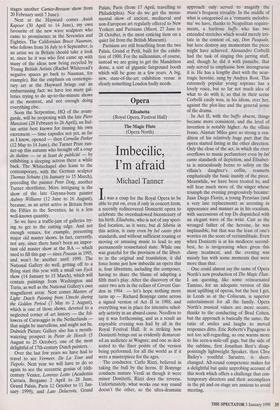Opera
Elisabetta (Royal Opera, Festival Hall)
Imbecilic, I'm afraid
Michael Tanner
It was a coup for the Royal Opera to be able to put on, even if only in concert form, a recently rediscovered Donizetti opera to celebrate the overshadowed bicentenary of his birth. Elisabetta, who is not of any speci- fied location, as it were, but di Siberia in this action, is zany even by bel canto plot standards, and without sufficient rousing or moving or amusing music to lead to any permanently resuscitated state. While one was grateful for the provision of the libret- to in the original and translation, it did force home just how imbecilic an opera this is, four librettists, including the composer, having to share the blame of adapting a fifth man's play. After the discovery of the outer two acts in the cellars of Covent Gar- den in 1984 — let's hope nothing more turns up — Richard Bonynge came across a signed version of Act II in 1988, and everything was in place for intensive schol- arly activity in an absurd cause. Needless to say it was forthcoming, and as a result an enjoyable evening was had by all in the Royal Festival Hall. It is striking how Donizetti brings out as evidently demarcat- ed an audience as Wagner, and one as ded- icated to the finer points of the version being performed, for all the world as if it were a masterpiece for the ages.
The conductor, Carlo Rizzi, believed in taking the bull by the horns. If Bonynge conducts mature Verdi as though it were minor Donizetti, Rizzi does the reverse. Unfortunately, what works one way round doesn't the other, so the ultra-dramatic approach only served to magnify the music's frequent triviality. In the middle of what is categorised as a 'romantic melodra- ma' we have, thanks to Neapolitan require- ments, a baritone buffo who has two extended stretches which would merely irri- tate in the context of, say, Don Pasquale, but here destroy any momentum the piece might have achieved. Alessandro Corbelli had the task of singing this jarring stuff, and, though he did it with panache, that only served to emphasise how incongruous it is. He has a lengthy duet with the near- tragic heroine, sung by Andrea Rost. This extremely popular young soprano has a lovely voice, but so far not much idea of what to do with it, so that in their scene Corbelli easily won, in his idiom, over her, against the plot-line and the general sense of the drama.
In Act II, with the buffo absent, things became more consistent, and the level of invention is notably higher. As the villain Ivano, Alastair Miles gave so strong a ren- dition of his relatively huge part that the opera started listing in the other direction. Only the close of the act, in which the river overflows to music perfunctory even by bel canto standards of depiction, and Elisabet- ta is miraculously borne to safety on the villain's daughter's coffin, reasserts emphatically the basic inanity of the piece. Meanwhile, we have been treated to, and will hear much more of, the singer whose triumph the evening progressively became: Juan Diego Florez, a young Peruvian (and a very late replacement) as arresting in appearance and manner as in his vocalism, with successions of top Ds dispatched with an elegant wave of the wrist. Cast as the wronged father of the heroine, he was implausible, but that was the least of one's worries on the score of verisimilitude. Even when Donizetti is at his mediocre second- best, he is invigorating when given this classy treatment, and the evening was mainly fun with some moments that were more than that.
One could almost say the same of Opera North's new production of The Magic Flute. I am questing, like some reincarnated Tamino, for an adequate version of this most uplifting of operas, but the best I get, in Leeds as at the Coliseum, is superior entertainment for all the family. Opera North's musical values are more secure, thanks to the conducting of Brad Cohen, but the approach is basically the same, the ratio of smiles and laughs to moved responses ditto. Eric Roberts's Papageno is not too self-regarding, so one warms more to his seen-a-mile-off gags, but the side of the sublime, first Jonathan Best's disap- pointingly lightweight Speaker, then Clive Bailey's youthful Sarastro, is short- changed. All-round competence makes for a delightful but quite unprobing account of this work which offers a challenge that con- temporary directors and their accomplices in the pit and on stage are anxious to avoid meeting.


















































 Previous page
Previous page